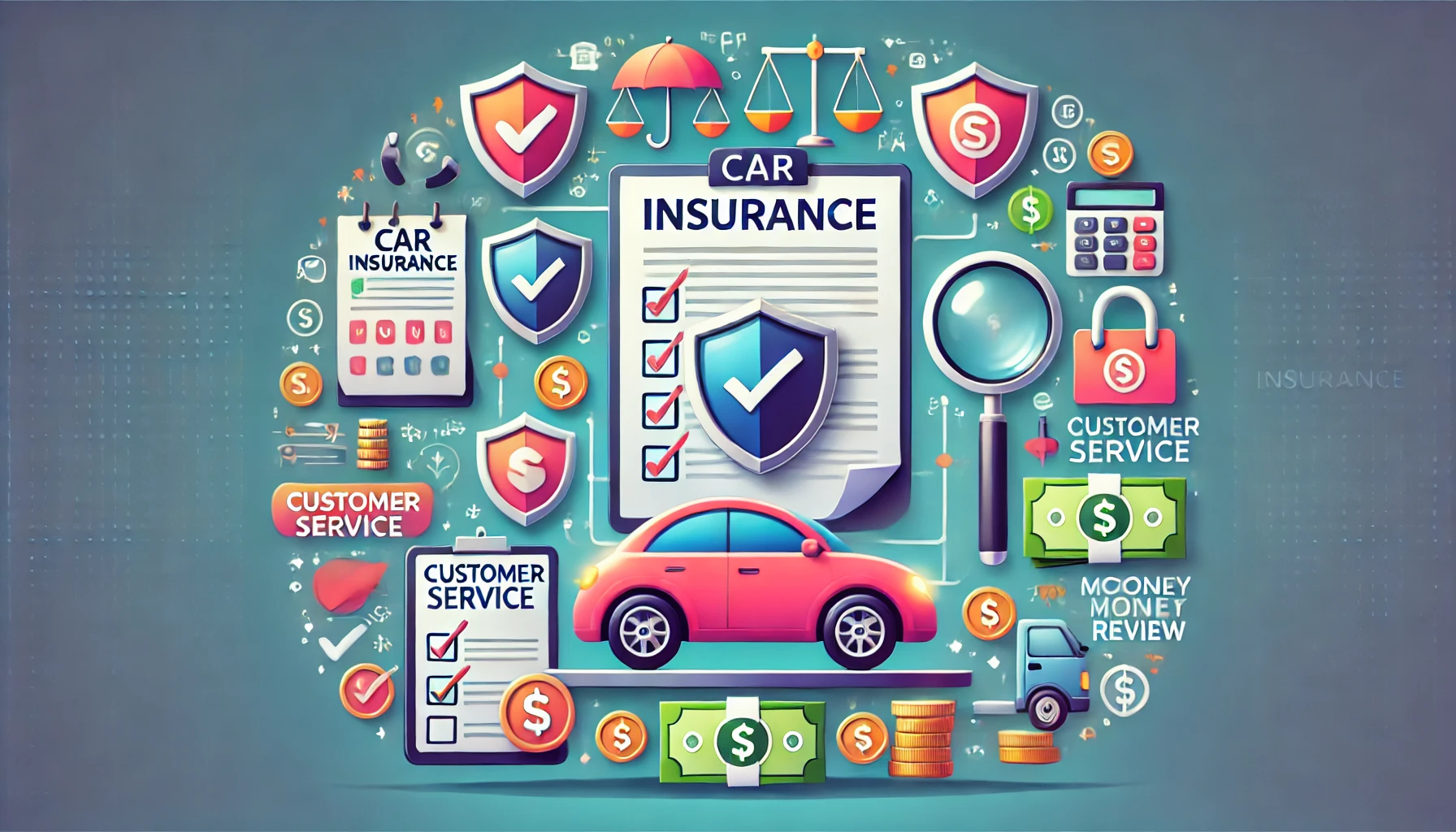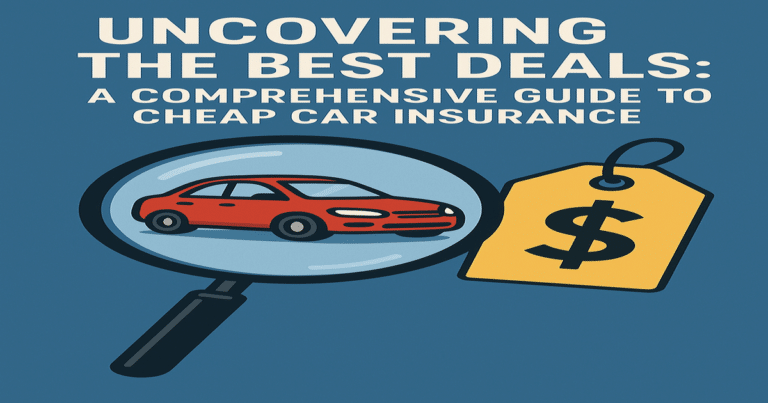The Ins and Outs of Car Insurance Companies: A Comprehensive Guide
Owning a vehicle comes with the essential duty of getting car insurance. While it might seem simple, the world of car insurance companies is complex and often overwhelming. From the various types of coverage available to the nuances of price comparisons and claims processing, there is a lot to unpack. This guide will help simplify those complexities and empower you to make informed decisions about your car insurance.
Understanding Car Insurance
Car insurance is fundamentally a contract between the insured and the insurer. As a policyholder, you pay a premium, and in return, the insurance company agrees to cover certain costs in case of accidents, theft, or other vehicle-related incidents. Grasping how car insurance functions is vital before exploring different insurance options and providers.
Different types of car insurance coverage include:
- Liability Coverage: Mandatory in most states, this covers bodily injury and property damage to others in an accident for which you are at fault. For instance, if you cause an accident that results in $15,000 worth of damage, liability will cover that cost.
- Collision Coverage: This covers damage to your own vehicle following a collision, irrespective of fault. For example, if you hit a tree and your car incurs $3,000 in damages, collision coverage would pay for the repairs.
- Comprehensive Coverage: This protects against non-collision-related incidents such as theft or natural disasters. It’s especially beneficial to car owners in areas prone to hurricanes or floods.
- Personal Injury Protection (PIP): Known as no-fault insurance, PIP covers medical bills for you and your passengers, regardless of fault. This can be invaluable; for instance, if an accident results in $10,000 in medical costs, PIP can cover these expenses.
- Uninsured/Underinsured Motorist Coverage: This type of insurance shields you in the event of an accident caused by a driver lacking adequate insurance. In 2021, approximately 13% of drivers in the U.S. were uninsured. This coverage becomes critical in such situations.
The Importance of Comparing Car Insurance Companies
With so many car insurance companies available, comparing different options is essential. Not all insurers provide the same coverage or rates. Here are factors to keep in mind when comparing companies:
- Premium Rates: These can vary widely between companies offering the same coverage. For instance, one company may offer a quote of $1,200 annually while another provides $800 for the same protection. Getting multiple quotes can save you hundreds of dollars.
- Coverage Options: Some providers offer unique coverage types or discounts that may fit your needs better. For example, a company might have a bundle discount for multiple policies, saving you up to 25%.
- Customer Service: Research companies with strong customer service reputations. Reading reviews on platforms such as Trustpilot can give insight into how responsive a company is to its clients.
- Claim Process: The speed and ease of handling claims can differ greatly from one company to another. It’s worth checking how quickly a company processes claims; the average duration can range from a few days to several weeks.
- Discount Opportunities: Many companies provide various discounts, such as for safe driving or membership in certain organizations. For example, a safe driver discount can often reduce premiums by 10% to 20%.
Top Car Insurance Companies to Consider
Several car insurance companies stand out due to their reliability and customer satisfaction. Here are a few to consider:
1. State Farm
State Farm ranks as one of the largest car insurance providers in the U.S. It boasts an extensive agent network and offers a variety of coverage options, including discounts for safe driving, which can average around $800 off your annual premium.
2. Geico
Geico is known for its competitive rates and user-friendly digital platform. It often attracts younger drivers seeking affordable options. Customers typically save around 15% when switching to Geico.
3. Progressive
Progressive is recognized for its innovative policies and unique comparison tools on its website, allowing you to see your rates alongside other brands. Their bundling discounts can result in up to a 25% savings.
4. Allstate
Allstate is respected for its commitment to customer service and has a variety of coverage choices. Their Drivewise program rewards safe drivers with discounts that can reach 30% off.
5. USAA
Primarily serving military members and their families, USAA is highly praised for customer satisfaction and competitive rates. Though limited in eligibility, it consistently ranks high in reviews and often offers discounts up to 10% for safe practices.
The Role of Technology in Car Insurance
The car insurance industry is rapidly evolving due to technology. Insurers are adopting data-driven methods to offer personalized policies. Here are emerging trends:
- Telematics: Many insurers offer programs that track driving behavior using devices or apps. For example, good drivers can save up to 30% on premiums based on their driving habits.
- Mobile Apps: Companies have developed apps that make managing policies and filing claims more accessible. About 60% of consumers prefer mobile solutions for quick access to insurance information.
- Artificial Intelligence: AI is increasingly used in underwriting and claims processing to streamline operations. This can speed up the claims process by days or even weeks, providing a significant advantage during stressful times.
How to Choose the Right Car Insurance Company
Selecting the best car insurance company for your needs can be streamlined with a few key steps:
- Assess Your Needs: Review what type of coverage you require based on the vehicle you drive, your driving habits, and your budget.
- Get Multiple Quotes: Reach out to different insurers for quotes, enabling side-by-side comparisons of policies.
- Read Reviews and Ratings: Utilize platforms to check consumer reviews and ratings from agencies like J.D. Power, which can give valuable insight into provider performance.
- Understand the Fine Print: Review policy terms and conditions carefully. Pay special attention to exclusions that may limit your coverage.
- Ask Questions: If anything is unclear, reach out to customer service representatives. A reputable insurer will always be willing to help.
The Claims Process: What to Expect
When facing the unfortunate event of an accident or damage, understanding the claims process is crucial. Here’s what typically happens:
- Report the Incident: Quickly contact your insurance company to report the incident, providing all necessary details.
- Claims Adjuster Review: An adjuster from the insurance company will be assigned to investigate the claim, which may involve assessing damage and reviewing police records.
- Documentation and Decision: Submit required documents like repair estimates. The insurer will review everything before making a decision.
- Settlement Offer: Once your claim is approved, the insurance company will provide a settlement offer detailing how much they will cover for damages or expenses.
- Receive Payment: If you accept the settlement, payment is made directly to you or your chosen repair shop or medical provider.
Final Considerations When Dealing with Car Insurance Companies
Navigating car insurance can be easier with a well-informed approach. Here are a few final thoughts to ponder:
- Renewal Process: Review your policy during renewal periods to ensure it aligns with your current situation.
- Policy Adjustments: If you add a vehicle or your driving habits change, contact your insurer to adjust coverage as needed.
- Maintain a Good Driving Record: Safe driving practices not only promote safety but can also lead to lower premiums.
- Take Advantage of Discounts: Always ask about available discounts to help reduce costs on your policy.
- Shop Regularly: Frequently comparing rates can uncover better coverage options and savings that enhance your insurance experience.
Making Informed Choices for Your Car Insurance Needs
Venturing into the world of car insurance can be manageable with the right preparation. By understanding different coverage options, comparing providers, and mastering the claims process, you can better navigate this essential aspect of vehicle ownership. Whether you lean toward affordability, customer service, or unique coverage types, dedicated research will guide you to the right insurance provider. Ultimately, the goal is not just to find a good company but to tailor coverage that fits your individual driving needs perfectly.



